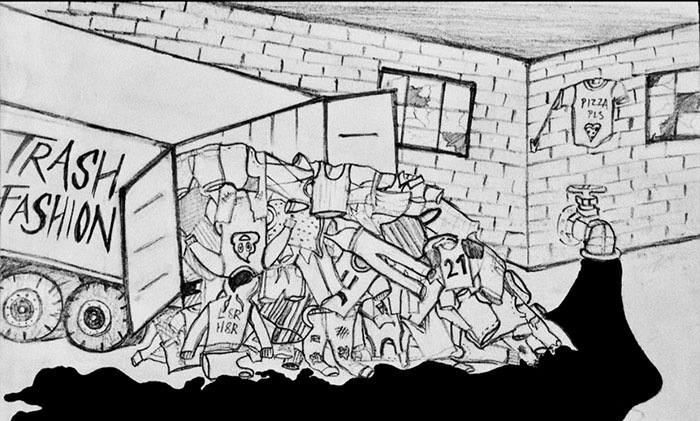For-never 21: The death of fast fashion
The overwhelming supply of low quality clothing from Forever 21 has not only hurt their business but the environment as well.
From the massive piles of mini skirts flooding into the aisles to finding a potentially cute shirt only to turn it around and see “I don’t care. I’m getting tacos” printed on the back, shopping at Forever 21 is rarely a satisfying experience. This has definitely contributed to its recent downfall.
Forever 21 was once a $4.4 billion retail powerhouse, but inevitably the company is filing for bankruptcy. This was caused by a snowball effect of problematic behaviors driven by the industry of fast fashion.
Fast fashion works exactly like fast food. Both are easy to make, extremely affordable and the quality of the product is highly questionable. If you can willingly buy 10 chicken nuggets from Burger King for $1 without pondering if it is suitable for human consumption, Forever 21 is the place for you.
Forever 21 has become successful by utilizing quantity over quality to capitalize on whatever is currently trending. Keeping up with the times by plastering quirky phrases on hoodies and handbags and selling them dirt cheap is precisely the company’s formula for maximizing profit.
One of the most controversial methods of fast fashion companies is the exploitative use of cheap, overseas labor. According to a Vox magazine article titled “The environment and economy are paying the price for fast fashion — but there’s hope”, companies like Forever 21 have come under fire in the past for allowing inhumane working conditions accompanied by underpayment of their factory employees. Environmental insensitivity also plays a role as these workers are exposed to toxic chemicals that pollute the air and water.
Now, a $3 t-shirt seems harmless at first, but the rate at which Forever 21 mass-produces its clothing has many dangerous implications. The retail giant relies on constantly releasing new products to maintain cultural relevance instead of restocking its current supply. This forces consumers to buy more, for a new product may go quickly out of style.
This shorter-than-average lifespan of clothing has created an excess in landfills across the globe which ultimately contribute to the problem of climate change. Research journal Nature.com states “Textile production is one of the most polluting industries, producing 1.2 billion tonnes of CO2 equivalent per year, which is more emissions than international flights and maritime shipping.”
Forever 21 is planning to file for chapter 11 bankruptcy, which means the company is not closing down as a whole but instead is scaling down by closing stores for the purpose of reorganizing.Although this may not be the end of Forever 21, consumers should be more conscious about the longevity of its wardrobe. This can be done by prioritizing quality when shopping, switching to sustainable brands and mending clothes that get worn out.
Buying new clothes should be a worthwhile investment, and fast fashion is the very antithesis of that. And to be completely honest, two months from now you’ll regret that t-shirt with an embroidered pizza on it.



